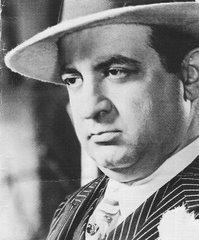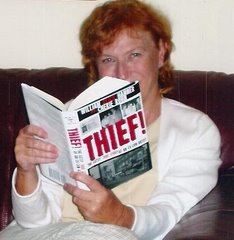 Seems like many Chicagoans believe corruption will always reign. On the following site citizens express dismay over the never-ending history of corruption: http://wordpress.com/tag/chicago-corruption/. (Governor Rod Blagojevich pictured in photo at right)
Seems like many Chicagoans believe corruption will always reign. On the following site citizens express dismay over the never-ending history of corruption: http://wordpress.com/tag/chicago-corruption/. (Governor Rod Blagojevich pictured in photo at right) Jennifer Haberkorn of the Washington Times seemed to hit all the major points:
Tuesday, December 23, 2008
CHICAGO
A joke that made its way around Illinois in the 1970s was that if Libyan strongman Moammar Gadhafi wanted to give a local politician $1 million, funneled through a foreign bank, it would be a perfectly legal campaign contribution as long as it was disclosed.
CHICAGO
A joke that made its way around Illinois in the 1970s was that if Libyan strongman Moammar Gadhafi wanted to give a local politician $1 million, funneled through a foreign bank, it would be a perfectly legal campaign contribution as long as it was disclosed.
Nowhere else in the country could a politician accept such a large donation from a non-American through a foreign corporation - let alone from such a controversial public figure.
ASSOCIATED PRESS Mobster Al Capone, here in 1931, got away with gambling and selling alcohol during Prohibition because he had a tight grip on City Hall. His men were known to roam the building looking for favors.
"But that's how things work here," said David Morrison, deputy director of the Illinois Campaign for Political Reform.
Not much has changed in Illinois politics since 1969, when Mr. Gadhafi took power thousands of miles away.
Political corruption has a long history here, and it isn't likely to go away anytime soon, locals say. Democratic Gov. Rod R. Blagojevich's recent arrest by the FBI on suspicion of trying to sell President-elect Barack Obama's Senate seat threatens to keep the stain alive.
Since 1971, more than 1,000 people in the Land of Lincoln have been convicted on public corruption charges. A handful were businesspeople, but most were elected officials.
There have been Chicago aldermen, county judges, city clerks, bailiffs and three governors, according to a tally kept by Dick W. Simpson, a former Chicago alderman and head of the political science department at the University of Illinois at Chicago.
There have been Chicago aldermen, county judges, city clerks, bailiffs and three governors, according to a tally kept by Dick W. Simpson, a former Chicago alderman and head of the political science department at the University of Illinois at Chicago.
Corruption dates to at least 1869, when three county commissioners were charged with signing fraudulent contracts to paint Chicago's City Hall. Three painters used whitewash and skimmed the difference.
In a city and state whose best-known resident worldwide could be Al Capone, that bit of thievery certainly wasn't the last. Politicians, police officers and even the 1919 Chicago White Sox have been accused of corruption.
Capone, for instance, was able to get away with gambling and peddling Prohibition-era booze largely because of his tight grip on City Hall. He contributed "substantially" - some said $260,000 - to Mayor William Hale "Big Bill" Thompson's 1927 campaign, according to Douglas Bukowski, author of "Big Bill Thompson, Chicago, and the Politics of Image."
Capone kept an office one block from the mayor's office, and he and his men were known to walk around City Hill, asking for favors.
Business expense?
Business expense?
Some Illinois business owners accept bribes as a typical business expense.
In the 1970s, the owner of the Arlington Park and Washington Park racetracks wrote off bribes to former Gov. Otto Kerner on her taxes, thinking they were a legitimate business expense. Her tax statement prompted an investigation into Kerner, who in 1973 was found guilty of accepting the bribes to build expressway exit ramps near the tracks.
Two other Illinois governors have been found guilty of political corruption as well.
Dan Walker, who was governor in the 1970s, received fraudulent loans for his business and his yacht, the Governor's Lady.
Dan Walker, who was governor in the 1970s, received fraudulent loans for his business and his yacht, the Governor's Lady.
George Ryan, who held the governor's office from 1999 until 2003, is more than a year into a 6 1/2-year prison term after being found guilty of accepting bribes for trucking licenses as secretary of state, squashing an investigation and directing state contracts as governor.
He admitted to and apologized for his crimes for the first time this month as he appeals to President Bush for a last-minute commutation.
He admitted to and apologized for his crimes for the first time this month as he appeals to President Bush for a last-minute commutation.
Ryan is at the Federal Correctional Institution in Terre Haute, Ind., after spending a year at a minimum-security prison in Oxford, Wis. - a popular destination for convicted Illinois pols.
So many public officials end up there that, upon seeing each other inside, they call out "Quorum call!" said author James L. Merriner in his book "Grafters and Goo Goos: Corruption and Reform in Chicago 1833-2003."
Former Rep. Dan Rostenkowski has referred to his time there - before a pardon from former President Bill Clinton - as his "Oxford education." Mr. Rostenkowski pleaded guilty to two charges of mail fraud for charges such as paying employees to do personal services and billing taxpayers for personal gifts.
Politicians, analysts and voters say political patronage has fueled this city's and state's temptation to the unseemly, one they say isn't going to wane until voters get fed up and elect true reformers.
"We have this situation because we have machine politics in both the city and the state - and it's both Democrats and Republicans," Mr. Simpson said.
Machine politics
Analysts say machine politics - in which financial contributions and party loyalty are rewarded with jobs and contracts - was cultivated and perfected by former Chicago Mayor Richard J. Daley, the current mayor's father.
Analysts say machine politics - in which financial contributions and party loyalty are rewarded with jobs and contracts - was cultivated and perfected by former Chicago Mayor Richard J. Daley, the current mayor's father.
He was never charged with any kind of corruption, but many of his employees were.
Voter groups are pushing for more stringent campaign contribution laws. Under the current system, any person, corporation or group can donate any amount of money to any candidate. The groups say limits would stem bribes and promises of goods or jobs in exchange for contributions. There are restrictions in most states and at the federal level.
Voter groups are pushing for more stringent campaign contribution laws. Under the current system, any person, corporation or group can donate any amount of money to any candidate. The groups say limits would stem bribes and promises of goods or jobs in exchange for contributions. There are restrictions in most states and at the federal level.
The first limit on campaign contributions, which would curtail contributions from companies with state contracts, is scheduled to go into effect in January. The law's enactment was part of what began Mr. Blagojevich's fundraising flurry and prompted an investigation.
However, others argue that public officials or citizens who want to influence the other will find a way around such legislation.
State Rep. Jim Durkin, a Republican who represents a district in the western suburbs of Chicago and is the minority leader of the General Assembly's impeachment committee, points to convicted Washington superlobbyist Jack Abramoff, who bribed lawmakers despite federal restrictions.
"We can make all the changes in the law that we want, but it's not going to change attitudes," Mr. Durkin said. "We can't legislate morals."
Mr. Durkin, who ran unsuccessfully against Sen. Richard J. Durbin in the Illinois Democrat's 2002 re-election campaign, said he hopes that if anything, the latest scandal will entice voters to "get a better idea of the individuals they are voting for."
Some Republicans were quick to label Mr. Blagojevich's troubles as typical Illinois politics. He is accused of trying to "sell" the open Senate seat, attempting to bribe the Chicago Tribune to get rid of editorial writers he didn't like and withholding state funding in exchange for campaign contributions.
"This wasn't a secret," one Illinois Republican operative said of Mr. Blagojevich. "No one in the Democratic Party stood up and said, 'You have a serious problem with the feds; you need to step aside.' No one ran against him in the [2006] primary."
Mr. Blagojevich easily beat the one Democratic Chicago alderman who ran against him in the primary.
The Republican National Committee issued video ads highlighting links between Mr. Obama and the antics of his home state's politicians, but conventional wisdom says Mr. Obama and Mr. Blagojevich aren't close.
The Obama campaign committee donated just $1,000 to Mr. Blagojevich's campaign fund in October 2002, a small amount in Illinois politics.
Chicago newspapers reported that Mr. Obama's chief of staff is on wiretapped conversations speaking with Mr. Blagojevich's team, pushing for Obama associate Valerie Jarrett to get the open seat. Mr. Blagojevich, in clear and vulgar terms, says the Obama team isn't prepared to "pay to play" for the seat, according to the criminal complaint.
Others say linking Mr. Blagojevich and Mr. Obama isn't fair.
Former Rep. Cardiss Collins, a Chicago native who represented Illinois' 7th Congressional District from 1973 to 1997, said she was "embarrassed" when she heard the latest corruption story, but the bad apples in the bunch don't taint all Illinois politicians, particularly not the president-elect.
"It's a sad commentary on the governor," she said. "To splash it on the president-elect is wrong."
Copyright 2009 The Washington Times, LLC
[reprinted with permission]



No comments:
Post a Comment